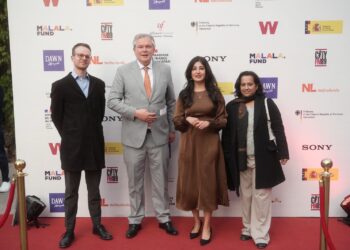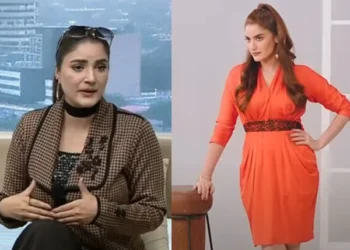Introduction: A Bold Voice Among the Glamour
Pakistani actress and model Saheefa Jabbar Khattak has recently ignited an important conversation in the Pakistani entertainment industry. In a series of candid and emotionally charged Instagram stories, Saheefa criticized the deeply entrenched flaws, unprofessional behavior, and superficiality that dominate the country’s drama and television sector. Her revelations, coming from someone who has worked within the industry, have sparked widespread debate and highlighted the urgent need for reform.
Criticism of Superficial Glamour and Empty Entertainment
In her heartfelt posts, Saheefa raised serious concerns about the priorities of the Pakistani drama industry. According to her, glamour and surface-level entertainment are given preference over meaningful storytelling. She emphasized that while she never faced a lack of job opportunities, she consciously turned down numerous projects because they lacked depth and social value.
She highlighted her decision to work only in dramas like “Beti” and “Bhool,” both of which addressed important societal issues. These dramas, she noted, were chosen because of their strong messages and relevance to real-life problems, rather than their commercial viability.
Script Selection Driven by Profit, Not Purpose
One of the core issues Saheefa addressed was the script selection process. She criticized the industry’s overemphasis on commercial success, arguing that this mindset stifles creativity and prevents the production of content that truly resonates with audiences.
“As long as our only criterion is profit,” she wrote, “we will continue producing unrealistic and shallow stories.”
She called for a shift in focus from monetary gain to narratives that reflect the true fabric of society. According to Saheefa, the industry must embrace stories that portray the hardships, joys, and complexities of real people.
Unrealistic Styling and Character Representation
Another significant point Saheefa made was about the styling and characterization in Pakistani dramas. She pointed out the disconnect between characters and their visual portrayal. Often, characters are depicted in lavish clothing and immaculate makeup, even when their roles suggest they come from poor or struggling backgrounds.
“We need to portray characters as per their class, background, and real-life struggles,” she said. “Truth should matter more than artificial beauty.”
This critique aligns with a growing demand from audiences for authentic representation over glamorized and fantasized narratives.
Ignored Social Issues: A Missed Opportunity for Impact
Saheefa urged the drama industry to focus more on social realities. She questioned why issues like drug addiction, poverty, and tragedies like the Kasur incident outside Data Darbar are ignored in mainstream storytelling. These stories, she argued, have the power to not only shock viewers but also inspire change and spark important conversations.
She lamented that the media is failing its role in being a mirror to society. “These are our truths. These are our stories. Why don’t we talk about them?”
Poor Working Conditions and Artist Exploitation
One of the most alarming revelations Saheefa shared was about the working conditions for artists on sets. She described how:
- Artists often wait months to receive payment.
- Contracts are rarely honored.
- Basic facilities like clean restrooms and separate dressing areas are nonexistent.
- Male and female actors are often forced to eat, dress, and rest in the same shared space.
These conditions reflect a deep-seated lack of professionalism and respect for artists, which, if not addressed, could discourage talented individuals from pursuing careers in showbiz.
Toxic Culture and Misplaced Priorities
Saheefa also touched on the toxic culture that permeates the industry. She noted that punctual, respectful, and hardworking actors are often labeled as “difficult,” while those who are unprofessional, tardy, and demanding are favored and celebrated.
This flawed reward system, she suggested, not only demoralizes committed artists but also creates a culture of favoritism and mediocrity.
A Call to Action: “Why Don’t We Talk About What Really Matters?”
In a powerful conclusion to her social media posts, Saheefa posed a rhetorical yet piercing question: “Why don’t we talk about the issues that actually matter?” Her words are a call to action for writers, producers, directors, and viewers to demand more from Pakistan’s entertainment industry.
Public Reaction: A Mixed Yet Thought-Provoking Response
Following Saheefa’s posts, reactions from fans, fellow actors, and media analysts have been mixed but largely supportive. Many praised her courage to speak up, especially in an industry where silence is often encouraged to maintain professional relationships.
Some insiders acknowledged that her concerns were valid, while others felt that change is difficult in a system so deeply tied to commercial interests. Regardless of the division in opinions, Saheefa has succeeded in bringing these important issues to the forefront.
The Way Forward: Reform, Representation, and Responsibility
If Pakistani showbiz truly wants to evolve, it must listen to voices like Saheefa’s. This means:
- Investing in scripts that offer depth and societal relevance.
- Improving on-set conditions for all artists and crew members.
- Creating fair contract systems with timely payments and proper legal backing.
- Embracing diversity in storytelling and character development.
- Encouraging accountability and discouraging favoritism.
Conclusion: A Courageous Voice in a Flawed System
Saheefa Jabbar Khattak’s bold critique is more than just a personal rant; it is a clarion call for change in an industry that holds massive influence over public opinion and culture. Her insights demand attention not just from industry insiders, but from viewers who support and consume this content.
By choosing integrity over popularity, and truth over glamour, Saheefa has set an example for other artists to speak up. The question now remains: Will the industry listen?

























